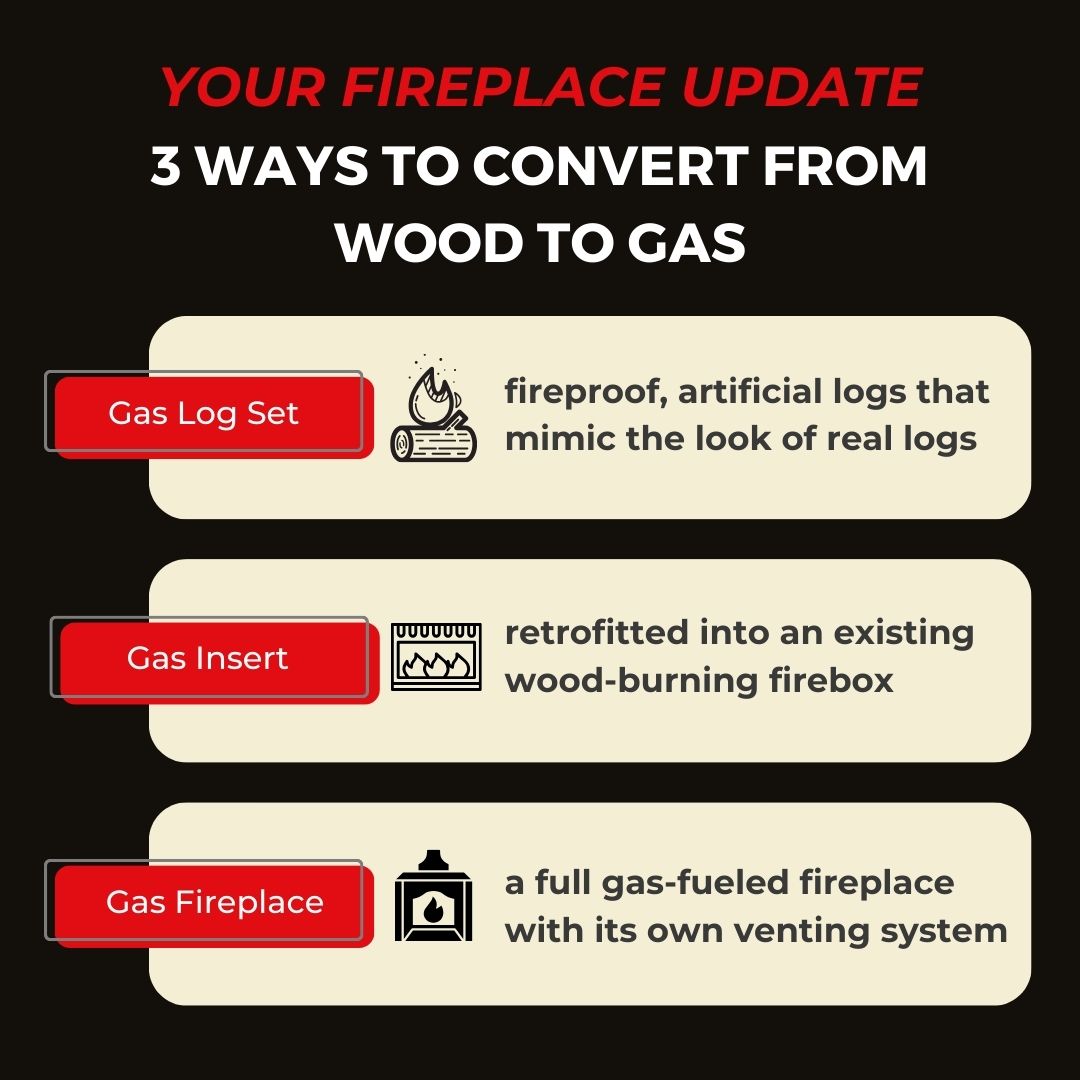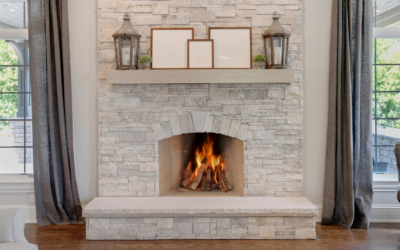You can absolutely convert your wood fireplace to gas! In fact, it’s become a popular option for homeowners who love the warmth a fireplace brings, but want to increase both convenience and efficiency. And finding and installing a gas fireplace option you love can be a smooth and successful process with the help of our knowledgeable team of pros.
If you’re in Greensboro, Raleigh, Durham, or anywhere close by, we’ll bring your needs and preferences to life in a beautiful fireplace you’ll love to use! Call or reach out online soon.
What Are Options for Converting My Wood Fireplace to Gas?
Ready to get started? You have some options. All will involve running a gas line to your new appliance, but no worries – our technicians are fully qualified to do so!

- Gas Logs: Gas logs are fireproof, artificial logs that mimic the appearance of real logs. These are fitted and installed into your existing fireplace, and they include a gas burner that offers a pretty straight-forward conversion. This is a great option if you love the aesthetic of your existing fireplace and want to keep the look of a wood-fueled blaze.
- Gas Inserts: Gas inserts are retrofitted into an existing wood-burning firebox. They’re incredibly efficient, effectively distribute heat, and have customizable options. Choosing a gas fireplace insert means choosing excellent efficiency and fuel savings. They also come in a range of dimensions so you can find a good fit, though it may require more modifications than gas logs do.
- Gas Fireplaces: A new gas fireplace may also be a great option. There’s a lot of flexibility in models, venting options, and installation choices here to help fit your situation. And if you’re hoping for a more substantial remodel, a new fireplace just might make sense.
How can Mr. Smokestack help?
Installing and maintaining fireplaces is our wheelhouse. When it comes to making changes to your fireplace, professional guidance is invaluable. We’re a well-established expert in fireplace services, and we aim to serve our customers with quality, integrity, and the highest standards in safety. We offer a wide range of excellent products, so you’re sure to find something you love, and our professional installation will help ensure your gas fireplace operates safely, efficiently, and in compliance with local codes, insurance, and manufacturer requirements.
Wood vs. Gas: Not Sure Which Fuel Type Is Best?
Both wood and gas fireplaces offer a lot to love, so deciding which is most suitable is primarily a matter of personal preference.
Pros & Cons of Wood-Burning Fireplaces
Wood burning fireplaces have many benefits, such as:
- Traditional appeal. Let’s face it, wood fireplaces exude charm and a homey ambiance. The crackling sound? The distinctive sweet smell? The dancing flames? It all says “You’re home – time to unwind and make memories” like little else can.
- Independence. If you’re looking for energy independence, burning wood offers it. Wood fireplaces don’t rely on gas or electricity, making them a gem during power outages.
- Fuel cost. If you have ready access to firewood, keeping your existing wood fireplace maintained and fueled can be a fairly low-cost endeavor.
Some of the drawbacks of wood fireplaces include:
- Maintenance & effort. With a wood fireplace, you’ll find yourself doing a bit more cleaning. You also need to maintain a wood pile, carefully start the fire, and manage it as it gradually burns down each time you use it.
Wood fireplaces can be more demanding and less convenient to use than gas ones.
- Lower efficiency levels. Generally speaking, a wood-burning fireplace isn’t going to beat a gas one when it comes to efficiency. Wood fireplaces let a lot of heat escape through the chimney, leading to high fuel consumption – with less heat actually making it in the room.
Pros & Cons of Gas Fireplaces
Here are some of the reasons people love gas fireplaces:
- Convenience. Don’t want to be troubled with getting logs to ignite and slowly build to a roaring blaze? You can have a gas fireplace going full-steam by pushing a button before you’ve even set down your bags or gotten the coffee fully brewed. You also won’t need to stock or handle firewood.
- Efficiency & clean burning. Gas fireplaces are highly efficient, especially new models. Your fuel is converted into usable heat without producing soot or ash, and there’s minimal impact on indoor air quality.
- Design flexibility. There are loads of options when it comes to gas fireplaces – from traditional charm to sleek, modern lines.
- Safety features. Gas fireplaces often include advanced safety features, as well as add-ons for controlling temperature and flame height precisely – making your fireside experience safer, comfortable, and highly customizable.
Some of the drawbacks of gas include:
- Dependence on gas supply. You will need a continuous gas supply, and if that supply is interrupted your fireplace won’t function.
- Initial costs. Converting to a gas fireplace can be a little on the costly side, especially if significant modifications are needed. For some, this is a deterrent, although we’ll always do our best to present great options to fit your budget.
- Ambiance. Some people just can’t give up the traditional feel of a wood fire. Gas fires are beautiful, but won’t generate the same crackle and aroma as wood.
Make Your Fireplace Dreams a Reality
Ready to turn your fireplace into the best version of itself? We’ll help you get the most out of your investment – call us or reach out online today.

